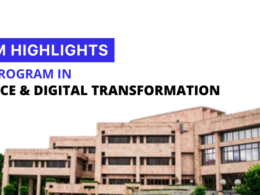Staying informed is so important. Guess which is one of the best sources to gain knowledge and stay updated? Books! These good old friends not only apprise you of the subject but also leave a lasting impression on your mind; you tend to remember everything that you read. And, when the field in question is the most popular- DATA SCIENCE, you ought to stay updated and regularly gain knowledge about the field with continuous development.
Data science is the process of deriving useful conclusions from the massive data, that may or may not be structured. Sounds not much of a job? Remember, truth is stranger than fiction. Howsoever easy it may sound, the complete process, right from data collection to reporting the findings, is not less than a tough nut to crack.
Get the pages flipping: Top must have data science books
Whether it is to read about something new, seek answers to your queries, brush up your basics or stay updated, taking a plunge into the mammoth sea of books is the most wise step.
Before you actually start on your reading journey, see data science as one big umbrella that houses many branches/subjects. This can understandably be a little overwhelming when you are a fresher. Don’t worry! To make sure that you stay clear of all the confusion, here is a structured list of books, in no specific order, which spans across various subjects in the realm of data science.
Let’s start flipping the pages…..
The Structured List
- Data Science
- Python and R
- Probability and Statistics
- Data Visualization
- Machine Learning
- Deep Learning
Data Science
- Data Science for Dummies

Author: Lillian Pierson
Original Publish Date: 20th February, 2015
Data Science for Dummies aims at making data science simple for beginners. Count on this elementary guide to learn the business aspect of data science and start in the field as a data science professional. This book is a comprehensive resource for the starters that provides them with the basic concepts of data science and its applicability in daily life.
Data Science for Dummies also houses a brief about topics, such as artificial intelligence, Python and R, data engineering, algorithms, data visualization, etc. Just curious about data science? Want to explain it to your grandparents or parents? Grab a copy now. - The Data Science Handbook: Advice and Insights from 25 Amazing Data Scientists

Authors: William Chen, Max Song, Carl Shan, and Henry Wang
Original Publish: 2015
Imagine, you are talking to the 25 of the top experts in the field and getting insights from them. Such a wonderful way! Right? The Data Science Handbook: Advice and Insights from 25 Amazing Data Scientists lets you do just that. It is a collection of interviews of top data scientists- from ex-Chief Data Scientist at The White House to the chief data scientists of the big organizations and the budding ones too. The aim is to let you have an exceptional insight into the industry, including tips on career advancement, try and fail and try again method and how to become successful in the data science field. Pick it up, if you wish to have an insightful and guiding companion and not if your wish is a technical expert. - Ethics and Data Science

Authors: DJ Patil, Hilary Mason, and Mike Loukides
Original Publish Date: 25th July, 2018
With the unprecedented rise in data science, there has been unwarranted inclusion of breach of privacy; rising need for data protection and other such issues. Ethics for Data Science has details on how to include principle of ethics into data science projects. You will find a practical checklist to refer to when building a project and some viable pieces of advice to practice ethics in the data science world. While in the world you will find a need to focus on the grievous issues, such as the misuse of data, this book will offer you some actionable points to deal with such problems and work on principles.
Python and R
- Fluent Python: Clear, Concise, and Effective Programming

Author: Luciano Ramalho
Original Publish Date: 24th July, 2015
You can always rely on the traditional programming book to learn Python, even when the market is flooded with several options that claim to be your effective Python trainer. Fluent Python: Clear, Concise, and Effective Programming is an ideal hands-on coding book that gives you an introduction about the working of Python and the key to writing useful Python code. This book includes many such libraries which you will definitely come across in your data science career. - Natural Language Processing with Python

Author: Steven Bird, Ewan Klein and Edward Loper
Original Publish: June 2009
When you are in the world of data science, natural language processing is something you will definitely be aware of. NLP will encompass computer manipulation of natural language. Taking the base of Natural Language Toolkit (NLTK) library, you will sail smoothly through the realm of Natural Language Processing (NLP) with the help of this book. Natural Language Processing for Python book has a practical introduction of the topic. Opt for this book to cover natural language processing in an ideal mix of theoretical and practical study. - R Cookbook

Author: Paul Teetor
Original Publish: January 2011
A comprehensive and excellent book with more than 200 practical recipes to ease the road of data manipulation and data analysis. R Cookbook doesn’t have any recipes repeated; each one is unique and approaches a new problem. You will find a variety of solutions, such as basic ones, general statistics, graphics, input and output, linear regression and graphics. This book is a perfect fit for both beginners and experts. Pick it up as a ready reference for revising your concepts and learning fresh programming topics.
Probability and Statistics
- Probability: For the Enthusiastic Beginner

Author: David Morin
Original Publish: 2016
Searching for a basic book on probability? Pick up Probability: For the Enthusiastic Beginner and start brushing up various concepts of probability. This is also an ideal choice for the ones who wish to learn probability from the scratch. Some of the topics covered in this book are- probability density, Bayes theorem, regression, combinatorics, expectation value. You will also come across few problems applying the concept of Calculus. Just like how a structured book should be, this book has around 150 solved problems, including the in-chapter questions and the ones solved at the end of each chapter. Choose this book, if you wish to have a guided resource on probability that has in-text discussion to make each topic comprehensible.
Data Visualization
- Storytelling with Data: A Data Visualization Guide for Business Professionals

Author: Cole Nussbaumer Knaflic
Original Publish Date: 7th October, 2015
One of the most important roles of a data scientist is to weave a story around the insights and thus, effectively communicate the findings to the non-technical business stakeholders. To make you adept in this task, Storytelling with Data: A Data Visualization Guide for Business Professionals lets you learn the data visualization fundamentals and storytelling skills. Empowered with real-world examples and illustrative text, you will be able to readily apply the learning to use data and present an intriguing, descriptive and fascinating story. Grab this book now to hone your storytelling skills and build on some new techniques too. - Effective Data Visualization: The Right Chart for the Right Data

Author: Stephanie D.H. Evergreen
Original Publish Date: 22nd April, 2016
Effective Data Visualization: The Right Chart for the Right Data is the creation of one of the most sought-after designers, researchers, and speakers, Stephanie D.H. Evergreen. This book details on the right way to create Excel graphs and charts that speak about your research and its insights. A comprehensive how-to guide, Effective Data Visualization: The Right Chart for the Right Data, includes a plethora of different graphs. It shows you which type of graph will be best suited for your specific story. The latest edition has details on nine new types of quantitative graphs, new shortcuts in Excel and a new chapter “Sharing Your Data with the World” that explains how to use dashboards, along with latest illustrations.
Machine Learning
- Machine Learning Yearning

Author: Andrew NG
Original Publish: Draft Copy
Authored by one of the most coveted names of the industry, Andrew NG, Machine Learning Yearning aims at spreading the word about the right way to structure projects in machine learning. It is the right resource, if you wish to know how and when to implement machine learning and the right way to deal with the intricacies in the application of AI in real-life. Pick up the draft copy after you have had experience in AI; also, if you wish to be guided on some crucial aspects, such as learning curves, debugging inference algorithms, dev and test sets and others. - The Hundred-Page Machine Learning Book

Author: Andriy Burkov
Original Publish: 2019
One of the crispiest introductions to the mammoth world of machine learning, The Hundred-Page Machine Learning Book is, by all means, a must-have book for all the professionals in the field of machine learning. This 100 page book is aptly suited for the busy professionals who find it tough to read a book due to their hectic schedules. But this is the beauty of the book that you won’t miss any basics and nitty gritty of the knowledge that a data scientist should have. - Elements of Statistical Learning

Authors: Trevor Hastie, Robert Tibshirani, Jerome Friedman
Original Publish: 2001
A sequel of ‘Introduction to Statistical Learning’, The Elements of Statistical Learning, approaches the machine learning algorithms in an in-depth manner. You might be apprehensive about the way content is covered in this book; don’t worry, the stress is on the concepts, which are explained with a statistical approach, not on mathematics. This is an illustrated guide with ample of examples to explain every concept and covers a wider range of topics from supervised learning to unsupervised learning. You will find a variety of topics, such as neural networks, ensemble methods, path algorithms, random forests, support vector machine and others. Pick it up, if you are a statistician or a data science professional and wish to dive deep into the world of machine learning.
Deep Learning
- Applied Deep Learning with Python

Authors: Alex Galea, Luis Capelo
Original Publish Date: 31st August, 2018
Filled with illustrated examples and natural explanations, Applied Deep Learning with Python is an ideal resource for building Python skills of the ones with no data science background. This book prepares you for the real-world skills needed in deep learning, through continuous activities and exercises. You will get to learn about basic skills like key visualization libraries, Jupyter environment, data sanitization techniques and others; right before your first predictive model is ready. Grab this book and hit the world of data science with out of the world Python programming. - Neural Networks and Deep Learning
Author: Michael Nielsen
Original Publish Date: Free online book
Neural Networks and Deep Learning lets you dive deep into the world of the neural networks. This free online book teaches you deep learning as a cluster of robust techniques to work with neural networks. Gradually moving from basic topics to advanced ones, this book also puts forth the modern techniques in machine learning. Pick it up to have with you written codes that make use of deep learning and neural networks to intricate problems related to pattern recognition (face, voice and image).
This ever evolving and constantly changing field of data science calls for being an active professional- in terms of learning, staying updated and constantly reading to gain knowledge. Who knows when you will be required to make use of the concepts you learnt in your graduation or apply some of the most advanced techniques? Go through the above list and start reading now!






